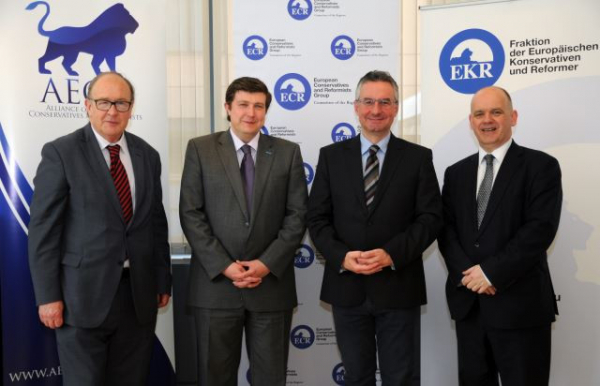ECR Group in the Committee of the Regions and the European Parliament join to bring EU decisions closer to citizens

The ECR Group in the Committee of the Regions and the European Parliament are going to be working together in a new policy group on subsidiarity and localism. The main objectives of the policy group, chaired by Andrew Lewer MBE MEP, will be to pool the local, regional, national and EU expertise of the ECR political family to help ensure that decisions are taken at the lowest practicable level. The policy group will consider the cost and impact of centralising decisions in Brussels, provide recommendations on inter-institutional planning and anticipate future milestones.
The ECR Group political family is at the forefront of generating forward-looking policy proposals to design a European Union that can support its Member States by focusing on areas where common action can offer added value to achieve shared goals.
"In the new mandate, we will continue to actively work with our political family in the EU to achieve a better working EU. We will be working to increase the EU's democratic accountability, its competitiveness and growth, to ensure full respect of the principles of subsidiarity, greater localism and a strong voice for local and regional government in guiding EU policies" said Councillor Gordon Keymer, President of the ECR Group in the Committee of the Regions.
With the aim of developing new ideas that can change Europe for the better in a demanding international environment, the ECR Group in the European Parliament and the Committee in the Regions will be working together in Policy Groups such as the Policy Group on Subsidiarity and Localism. The ECR Group member Cllr Roger Evans (Chairman of the London Assembly) as member of the Committee of the Regions’ Subsidiarity Steering Group strongly welcomed the establishment of this new Policy Group that will be chaired by former Committee of the Regions member, Andrew Lewer MBE MEP.
“Such policy groups play an important role in helping new ideas and solutions to be developed. We established policy groups in the London Assembly that delivered many successful results and I look forward to being active in this new Subsidiarity and Localism Policy Group to help deliver a better functioning EU,” said Cllr Roger Evans, member of the Committee of the Regions' Subsidiarity Steering Group.
A large number of policy fields are covered by existing EU legislation. These legislative acts usually contain review clauses allowing for the monitoring of the impact and effects of legislation. “We have a strong interest in providing well researched statements that can be trusted about what impact - negative or positive - EU legislation is having in local communities once it has been adopted” explained Andrew Lewer MBE MEP.
The Policy Group on Subsidiarity and Localism shall develop its own “subsidiarity score board” indicating the areas in which it is more practicable for the matter to be handled by local or national authorities in preference to the EU. The Policy Group shall enable local, regional and national mandate holders from the ECR Group’s political family to collectively anticipate and implement EU legal provisions on subsidiarity and proportionality, and facilitate the contribution of national parliaments.
The Alliance of European Conservatives and Reformists (AECR) President Jan Zahradil MEP, commented at the launch of the new policy group: “we have always favoured the exercise of power at the lowest practicable level – by the individual where possible, by local or national authorities in preference to supranational bodies. Our political family is at the forefront of generating forward-looking policy proposals to push decision-making back towards citizens and reverse the relentless centralisation of legislative power in the hands of distant and opaque EU institutions.”

